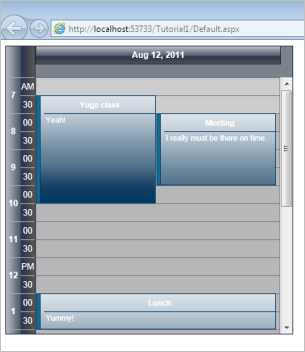This tutorial will show you how to create Contact, Location and Appointment objects.
1. Initial preparations
Follow the steps from 'Adding the control' topic - create a web site, add a Calendar control and a System.Web.UI.ScriptManager.
2. Set the control's properties
Select the Calendar control and click View -> Properties Window from the menu. In the Properties window change the CurrentView property to Timetable and Theme to Vista. Set the Calendar's Height and Width to 400px.
Click to expand 'Timetable Settings'. Set the StartTime property to '420' and EndTime property to '1260'. These designate minutes from the start of the day and mean from 7 AM to, but not including, 21 PM respectively.
3. Create data for the schedule
Switch to Code view and the following method to the page's code. Within this method we will define some items and resources to display in the calendar.
C#
 Copy Code Copy Code
|
|---|
private void CreateScheduleData()
{
} |
Visal Basic
 Copy Code Copy Code
|
|---|
Private Sub CreateScheduleData()
End Sub |
3.1 Creating contacts
Add the following code to the body of CreateScheduleData method:
C#
 Copy Code Copy Code
|
|---|
Contact contact1 = new Contact();
contact1.FirstName = "James";
contact1.LastName = "Jones";
Calendar1.Schedule.Contacts.Add(contact1);
Contact contact2 = new Contact();
contact2.FirstName = "Mary";
contact2.LastName = "Brown";
Calendar1.Schedule.Contacts.Add(contact2); |
Visual Basic
 Copy Code Copy Code
|
|---|
Dim contact1 As New Contact()
contact1.FirstName = "James"
contact1.LastName = "Jones"
Calendar1.Schedule.Contacts.Add(contact1) Dim contact2 As New Contact()
contact2.FirstName = "Mary"
contact2.LastName = "Brown"
Calendar1.Schedule.Contacts.Add(contact2) |
This code will create two contacts - James Jones and Mary Brown and add them to the Schedule's Contacts collection.
3.2 Creating locations
Add the following code to the body of CreateScheduleData method:
C#
 Copy Code Copy Code
|
|---|
Location location1 = new Location();
location1.City = "London";
location1.Name = "London";
Calendar1.Schedule.Locations.Add(location1); Location location2 = new Location();
location2.City = "Paris";
location2.Name = "Paris";
Calendar1.Schedule.Locations.Add(location2); |
Visual Basic
 Copy Code Copy Code
|
|---|
Dim location1 As New Location()
location1.City = "London"
location1.Name = "London"
Calendar1.Schedule.Locations.Add(location1) Dim location2 As New Location()
location2.City = "Paris"
location2.Name = "Paris"
Calendar1.Schedule.Locations.Add(location2) |
This code will create two locations - London and Paris and add them to the Schedule's Locations collection.
3.3 Creating appointments
Add the following code to the body of CreateScheduleData method:
C#
 Copy Code Copy Code
|
|---|
Appointment app1 = new Appointment();
app1.StartTime = new DateTime(DateTime.Now.Year, DateTime.Now.Month, DateTime.Now.Day, 8, 0, 0);
app1.EndTime = app1.StartTime.AddHours(2);
app1.Subject = "Meeting";
app1.DescriptionText = "I really must be there on time.";
app1.Locked = true;
app1.Location = location1;
app1.Contacts.Add(contact1);
Calendar1.Schedule.Items.Add(app1); Appointment app2 = new Appointment();
app2.StartTime = new DateTime(DateTime.Now.Year, DateTime.Now.Month, DateTime.Now.Day, 13, 0, 0);
app2.EndTime = app2.StartTime.AddHours(1);
app2.Subject = "Lunch";
app2.DescriptionText = "Yummy!";
app2.Location = location1;
app2.Contacts.Add(contact1);
Calendar1.Schedule.Items.Add(app2); Appointment app3 = new Appointment();
app3.StartTime = new DateTime(DateTime.Now.Year, DateTime.Now.Month, DateTime.Now.Day, 7, 30, 0);
app3.EndTime = app3.StartTime.AddHours(3);
app3.Subject = "Yoga class";
app3.DescriptionText = "Yeah!";
app3.Location = location2;
app3.Contacts.Add(contact2);
Calendar1.Schedule.Items.Add(app3); Appointment app4 = new Appointment();
app4.StartTime = new DateTime(DateTime.Now.Year, DateTime.Now.Month, DateTime.Now.Day, 20, 0, 0);
app4.EndTime = app4.StartTime.AddHours(1);
app4.Subject = "Dinner";
app4.DescriptionText = "with the family";
app4.Location = location2;
app4.Contacts.Add(contact2);
Calendar1.Schedule.Items.Add(app4); |
Visual Basic
 Copy Code Copy Code
|
|---|
Dim app1 As New Appointment()
app1.StartTime = New DateTime(DateTime.Now.Year, DateTime.Now.Month, DateTime.Now.Day, 8, 0, 0)
app1.EndTime = app1.StartTime.AddHours(2)
app1.Subject = "Meeting"
app1.DescriptionText = "I really must be there on time."
app1.Locked = True
app1.Location = location1
app1.Contacts.Add(contact1)
Calendar1.Schedule.Items.Add(app1) Dim app2 As New Appointment()
app2.StartTime = New DateTime(DateTime.Now.Year, DateTime.Now.Month, DateTime.Now.Day, 13, 0, 0)
app2.EndTime = app2.StartTime.AddHours(1)
app2.Subject = "Lunch"
app2.DescriptionText = "Yummy!"
app2.Location = location1
app2.Contacts.Add(contact1)
Calendar1.Schedule.Items.Add(app2) Dim app3 As New Appointment()
app3.StartTime = New DateTime(DateTime.Now.Year, DateTime.Now.Month, DateTime.Now.Day, 7, 30, 0)
app3.EndTime = app3.StartTime.AddHours(3)
app3.Subject = "Yoga class"
app3.DescriptionText = "Yeah!"
app3.Location = location2
app3.Contacts.Add(contact2)
Calendar1.Schedule.Items.Add(app3) Dim app4 As New Appointment()
app4.StartTime = New DateTime(DateTime.Now.Year, DateTime.Now.Month, DateTime.Now.Day, 20, 30, 0)
app4.EndTime = app4.StartTime.AddHours(1)
app4.Subject = "Dinner"
app4.DescriptionText = "with the family"
app4.Location = location2
app4.Contacts.Add(contact2)
Calendar1.Schedule.Items.Add(app4) |
This code will create four appointments and add them to the Schedule's Items collection.
Finally, add a call to the CreateScheduleData method to the page's Load event handler:
C#
 Copy Code Copy Code
|
|---|
protected void Page_Load(object sender, EventArgs e)
{
if (!IsPostBack)
{
CreateScheduleData();
}
} |
Visual Basic
 Copy Code Copy Code
|
|---|
Protected Sub Page_Load(ByVal sender As Object, ByVal e As EventArgs)
If Not IsPostBack Then
CreateScheduleData()
End If
End Sub |
4. Build and run
Run the web page. The image below depicts what the page output would look like:

 Copy Code
Copy Code
 Copy Code
Copy Code
 Copy Code
Copy Code
 Copy Code
Copy Code
 Copy Code
Copy Code
 Copy Code
Copy Code
 Copy Code
Copy Code
 Copy Code
Copy Code
 Copy Code
Copy Code
 Copy Code
Copy Code







